What is actually meant by overfishing of the oceans? Without our oceans, there would be no life on this earth. They cover 71% of the earth's surface, collect 97% of the water and store the CO2-emissions that we emit into the atmosphere. Nevertheless, we exploit them and therefore struggle today with one of the biggest environmental problems of our time - the overfishing of the oceans.
In this article I would like to explain everything you need to know about it. From the definition, facts, causes and consequences to sensible solutions and measures against overfishing.
Here is another short Table of contents for you:
What does overfishing mean?
Overfishing is the term used when there is excessive Decline of fish stocks and other marine species in the world's oceans as a result of human fishing. If more fish are taken from a body of water than can grow back or immigrate through natural reproduction, it is generally considered to be overfished.₁
Overfishing Statistics, Facts & Figures
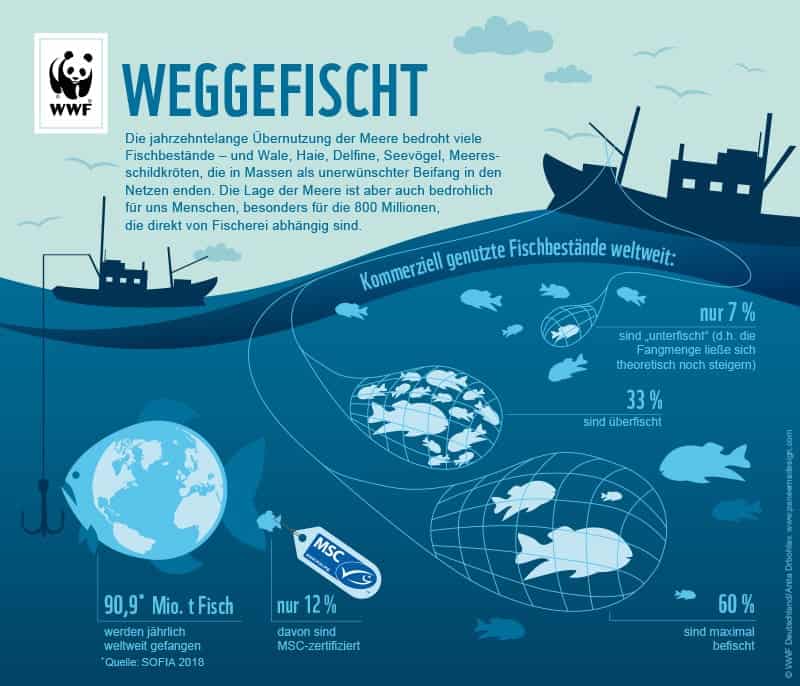
This graph from WWF on overfishing₂ shows, among other things, that 60% fish stocks are already exploited to the maximum and 33% have long been overfished. To support the urgency of appropriate measures and solutions in the fight against overexploitation of the oceans, I'll give you some more statistics here:
- In 2018, approximately 90.9 million tons of marine fish were caught worldwide.₃
- 61% of the fish consumed in Germany are imported from countries outside the EU. Only 39% of the fish come from European waters.₄
- In 2014, each person ate an average of 19.2 kg of fish. That is twice as much as 50 years earlier.₅
- Fishermen nowadays drop their nets up to 2000 meters into the depth (https://www.planet-wissen.de/natur/meer/ueberfischung_der_meere/index.html)
- According to calculations of the UN-According to the Unep environmental program, commercial fishing will no longer be possible worldwide by 2050 at the latest.₆
- Only 12% of the fish caught are MSC certified.₇
- In the near future, 26 million tons of fish could come from illegal and re-regulated fishing.₈
Notice: You can find even more numbers at Facts and statistics on overfishing.
Causes of overfishing
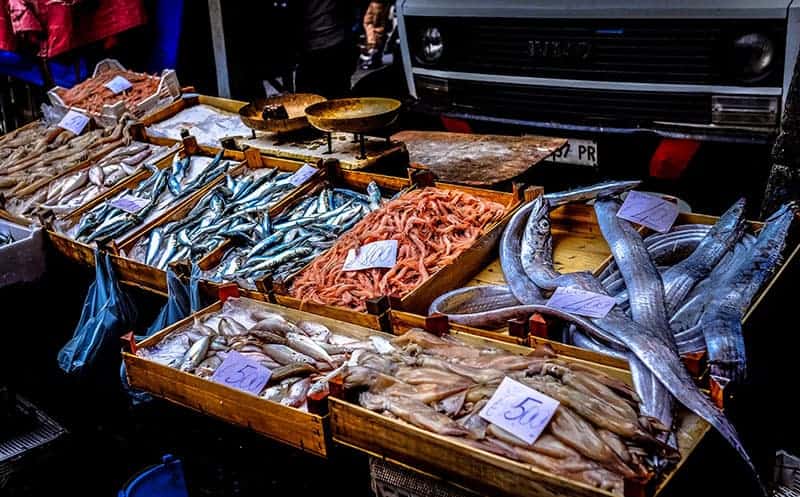
In order to be able to find a sensible measure against overfishing, we first have to take a closer look at the reasons for the strong decline in fish stocks. I would like to explain these to you in more detail in the following.
Demand for fish increased
In 2016, 154.4 million tons of fish were consumed worldwide. In 2009, the figure was 123.8 million metric tons.₉ This increase is primarily due to the disproportionate global population growth. Due to the increasing demand, fish must be caught or produced even faster - unfortunately at the expense of sustainability.
Fishing methods of fishing
The way in which fishing is carried out plays a decisive role in whether a fishery can be described as sustainable or not.
Many common fishing methods in deep-sea fishing senselessly kill fish, birds and mammals as bycatch. In addition, the seabed in particular is destroyed by trawl fishing. The nets dragged over the bottom destroy the entire habitat of marine animals, including their food sources.₁₀
Destruction of the seas
Our oceans have become a real Dump have become. More than 150 tons of plastic waste are said to already be in our oceans and every year another 8 million tons or so are added. Especially Microplastics in the sea is a massive problem that will eventually be Plastic in the food chain also ends up on our lunch table again.₁₁ In addition, factories are increasingly disposing of their wastewater in the earth's rivers - a good example of this is provided by the Fast Fashion Fashion Industry. Oil spills, such as the recent one off the island of Borneo₁₂, also promote human destruction of the marine habitat.
Climate change as a cause
The man-made climate change is one of the main causes of the decline in biodiversity and fish stocks in the oceans. It contributes massively to a decrease in the pH value of seawater and to the acidification of the oceans. Especially in cold and tropical waters, the increasing damage or loss of coral reefs due to rising water temperatures is currently being observed.₁₃
Tip: If you want to know how to Stop climate change in everyday life you can, feel free to look at the corresponding article.
Social dilemma on the issue of overfishing
The causes of overfishing in the oceans also include a social dilemma. With the increased catch quotas from the EU's Common Fisheries Policy, overfishing is being made a political goal. This is welcomed by the fishermen. And this is despite the fact that this project will cost them their jobs in the long term.₁₄ The main problem here is that the thinking is too short-term.
Consequences of the overfishing of the oceans
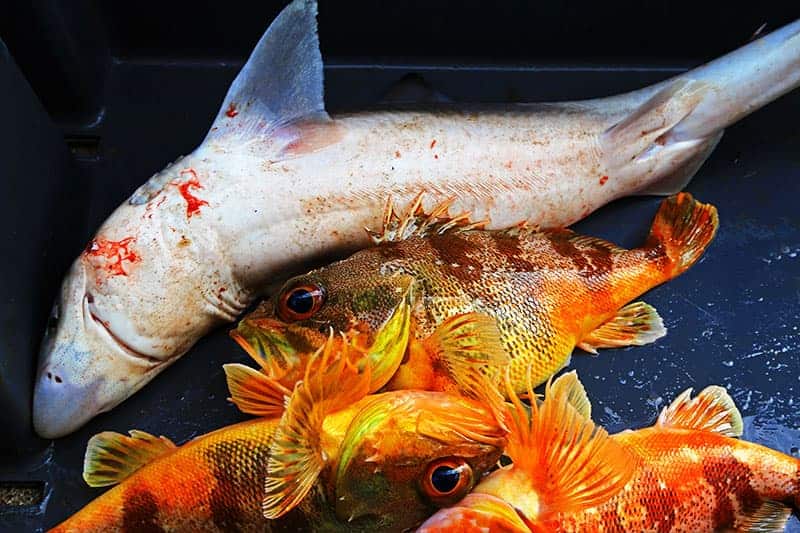
When about 80 million tons of fish are caught worldwide every year₁₅, this has consequences for the coexistence of marine animals, which in turn has consequences for the coexistence of us humans. In this regard, I would like to explain to you how the ecology and economy are changed by the overexploitation of the fish stock.
Ecological consequences
When more fish are taken from the sea than they can naturally reproduce, this obviously has an impact on marine life, as the ecological balance is disturbed. Here are some of the consequences for our environment at a glance.
Other fish species die in the bycatch
According to WWF, 300,000 whales, dolphins and porpoises as well as tens of thousands of sharks, seabirds and turtles die every year as unwanted bycatch of fishing.₁₆ This is not only more than questionable from an ethical point of view, but also destroys the sensitive ecosystem of the sea and, in the long term, also deprives people of their livelihood, who depend on the income from fishing. The high number of bycatch is primarily a consequence of the use of destructive fishing methods, such as trawling.₁₇
Species become extinct
The extreme decline in fish stocks naturally ensures that other marine animals are also dwindling or even becoming extinct. For example, fish feed on small crustaceans on the sea floor. When the destructive nets of trawl fishing have been dragged across the bottom, there is no life there anymore and certain fish lose their most important food source. The result is population decline - and depending on how badly a species is overfished, that can mean extinction. Climate change in particular is causing species extinction in the oceans, as increased CO2content in the atmosphere is absorbed by the world's oceans, these consequently become over-acidified and no longer represent a suitable habitat for mussels, oysters or shell-forming plankton, for example.₁₈
Jellyfish plagues due to lack of competition
The fact that spring plagues have occurred, for example, in the North Sea, the Mediterranean, Japan, or even Australia, is a logical reaction to the excessive removal of their food competitors from the sea. There is simply more food left for jellyfish. And jellyfish have hardly any economic benefit, so they are fished less frequently. Such plagues are therefore also a consequence of human activity.₁₉
Economic consequences
In Germany alone, the annual turnover of the fishing industry is around 2.3 billion euros.₂₀ It is only logical that the overfishing of the oceans also has a primarily economic impact on us. These are based primarily on the fact that a fish in the sea has value from an economic perspective in that it reproduces and gains weight itself. The catch yield would therefore be higher in the future if the fish remained in the sea. In this way, therefore, ultimately the removal of a fish from the sea also has its price, which in overfished waters is often higher than the attainable market price.₂₁
The more aggressive the overexploitation of the sea now, the worse the fishing industry will fare in the coming decades. Because if habitats are destroyed and fish stocks are overfished, the yield will inevitably fail to materialize. Also the Food Security of about 3.6 billion people, who feed mainly on fish, would be in great danger.₂₂
Solutions & measures against overfishing

With which means and measures can we as growing world population now contribute to the recovery of fish stocks? I have presented some of the most sensible answers to this complex problem below. I refer to everyday possibilities of each individual in everyday life and to the fish-friendly measures and decisions from politics and economy.
What can everyone do in everyday life?
As with so many environmental problems, everyone has to look at their own nose in the fight against overfishing of the oceans. Here you can find out how you can counteract the problem in your everyday life.
Fish-free, plant-based diet
Of course, the best way to counteract overfishing is to avoid fish altogether. This may sound bad for some, but other foods such as canola oil, walnuts, sunflower seeds or oatmeal are real, alternative protein suppliers. Take a look at the article about vegan protein sources an.
Tip: If you absolutely want to continue eating fish and still live sustainably then look out for the sustainability seals explained below when buying fish. Since aquacultures threaten habitats such as the mangrove forests and the corresponding fish in turn need food fish, you should avoid fish from aquacultures.₂₃ Use the best before buying the WWF Shopping Guide for Fish and Seafood.
Look for the MSC seal when buying
The MSC seal (Marine Stewardship Council) is a seal on product packaging that certifies sustainable fishing. It inspects fisheries and awards the sought-after seal if all sustainability criteria are met. With seals like MSC© or Naturland© and Bioland©, you can exclude illegal fishing and also basically assume that the fishermen use sustainable fishing methods and have little unwanted bycatch in the nets.
However, there is also justified criticism of the MSC. This is based primarily on the hasty awarding of the seal and the fact that even fisheries with trawl nets that touch the bottom were awarded the seal.₂₄ I can highly recommend this WDR documentary, because it takes a correspondingly critical look at the MSC seal:
Consider fish as a not everyday delicacy
There are foods that we can't just take for granted and eat every day. In addition to beef, this includes fish in particular. We can see the effects of the high demand for fish and meat. It has to be produced even faster and if that is not possible under natural conditions, ultimately our environment suffers. Therefore, see fish as a special delicacy that is only available a few times a month. That helps.
In the article about the Relationship between nutrition and the environment you will get a lot more information about it.
Petitions for the protection of the seas
A petition is a kind of collection of signatures that is forwarded to a responsible person in order to eliminate a certain grievance. By signing an existing petition or starting your own petition against overfishing, you can become part of the solution to this environmental problem. For example, advocate for more sustainable fishing quotas, stricter controls and larger marine protected areas.
Here are two meaningful petitions as an example:
- An end to illegal overfishing in EU waters (Open Petition)
- Innovative system with rotating protection zones on the sea (Change.org)
Inform friends and acquaintances about the problem of overfishing
As always, honest, fact-based word-of-mouth helps in the fight against overfishing. Tell others what they can do, and feel free to share this article. In this way, we'll accelerate the solution to the problem while also helping to ensure that Environmental problem of species extinction to fight.
What politics & business must do
Of course, as a consumer, you have a decisive influence on the environmental problem of overfishing. But the supply in the supermarket is controlled by companies from the production chain and the legal framework of politics. Accordingly, politics & business are also required to initiate measures to preserve the biodiversity of the oceans.
Establish protected areas
By establishing so-called MPAs (Marine Protected Areas), marine habitats can be protected from fishing. This not only promotes the recovery of biodiversity but also protects the fishing industry from extinction in the long term.₂₅
Greenpeace demands, based on expert opinions, that accordingly 30% of the world's oceans be placed under strict protection.₂₆
Subsidize aquaponics and other technologies
With the Aquaponics a much more sustainable solution to overfishing is available than aquaculture currently is. Aquaponics means a self-contained water and nutrient cycle that combines fish farming and vegetable cultivation.₂₇
Also vertical underwater farms for the cultivation of algae and mussels have a lot of potential to enable fish and also us humans to eat at the same time.₂₈
Policymakers need to promote these and many other great ideas and technologies.
Improve MSC seal
The MSC seal is considered a trustworthy seal for sustainable fishing. Nevertheless, it is still awarded far too quickly and subsequently insufficiently controlled. As the WDR documentary linked in this article shows, fisheries can, for example, use simple tricks to catch sharks and sell them with the MSC seal, although they have actually only received the seal for swordfish fishing.
The aim of the MSC was to mediate fairly between industry and nature conservation. But at the present time, the NGO increasingly represents the interests of the industry. In the long run, however, excessive fishing will destroy the fishing industry.
Adjust fishing quotas
It is good that the European Union has already set limits for industrial fishing with the catch quotas under the Common Fisheries Policy (CFP). Unfortunately, the actual fixed catches are still significantly higher than the scientifically recommended values. At this point, the short-term view from politics & economy becomes apparent again, which prefers economic interest over ecological interest. Here, a rethinking must take place that strictly adheres to scientific recommendations.
Fair conditions for fishermen from all over the world
In order to curb illegal fishing, both fish and fishermen must be offered a long-term perspective. The EU's so-called multi-year plans should regulate and implement this plan, at least within the European Union.₂₉ Problems arise primarily when countries from the EU import from non-EU areas. Therefore, politics must make fair fishery agreements with other states of this earth in order to fulfill sustainability, food bases and the continued existence of fisheries at the same time.₃₀
Prohibition of trade in shark fins
The so-called Shark finning refers to the severing of the fins and subsequent disposal of a shark in the sea. Since shark fin soup is considered a delicacy and status symbol, especially in China, an estimated 8,000 tons of shark fins are traded every year and 200,000 kg of shark are disposed of in the sea.₃₁ Since the sharks are usually still alive at this point, the immobilized animals suffocate in agony under water. In order to protect predators such as the shark, a trade ban must therefore be urgently adopted by the political side.
Promotion of sustainable fishing methods
A sensible policy decision would be to ban trawling and subsidize sustainable alternatives such as the so-called Flexnetz. It does not come into contact with the bottom, allows selective fishing and provides emergency exits that can help save unwanted bycatch.₃₂
Can we stop overfishing in the future?
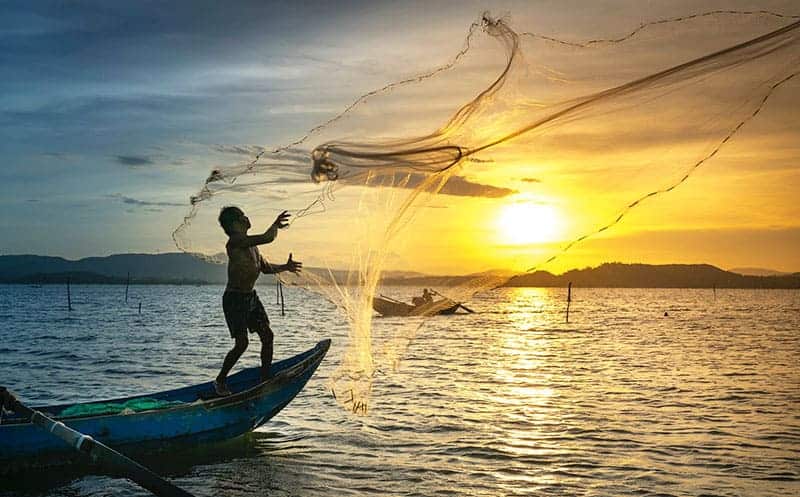
The more we overfish the stocks of the sea, the longer the ecological and economic crisis we provoke will last. It is incredibly important that we as consumers, but especially we as politicians and entrepreneurs, understand that the laws of nature are above man-made laws.
If we return to seeing fish and other marine life as a non-ordinary delicacy and allow the ocean time and space to recover, we can avoid a potential crisis in the fishing industry and save many marine species from extinction. You can learn more in my post called Stop overfishing.
What is your opinion about overfishing of the oceans? Feel free to write me a message with questions, tips or your own experiences in the comments.
Stay clean,

PS: Overfishing is only one of the biggest environmental problems that we humans have created. In the corresponding article you can now, for example, also read about the Environmental problem of air pollution inform
References:
₁,₁₄ https://de.wikipedia.org/wiki/Überfischung
₂,₃₀ https://www.wwf.de/themen-projekte/meere-kuesten/fischerei/ueberfischung
₃ https://www.fishforward.eu/de/project/ueberfischung-eine-tatsache-in-zahlen
₄ http://www.fao.org/3/a-i3844e.pdf
₅ FAO 2014, The State of World Fisheries and Aquaculture 2014, Rome, page 62.
₆ https://www.planet-wissen.de/natur/meer/ueberfischung_der_meere/index.html
₇ https://www.wwf.de/themen-projekte/meere-kuesten/fischerei/ueberfischung
₈ https://fischratgeber.wwf.at/hard-facts
₉ https://de.statista.com/statistik/daten/studie/292994/umfrage/fischkonsum-weltweit-nach-regionen
₁₀ https://www.planet-wissen.de/natur/meer/ueberfischung_der_meere/fangmethoden-100.html
₁₁ http://www.europarl.europa.eu/news/de/headlines/society/20181005STO15110/plastik-im-meer-fakten-auswirkungen-und-neue-eu-regeln
₁₂ https://www.youtube.com/watch?v=FWTQfxqVO-A
₁₃,₁₈ https://www.klimafakten.de/branchenbericht/was-der-klimawandel-fuer-die-fischereiwirtschaft-bedeutet
₁₅ https://www.fishforward.eu/de/project/ueberfischung-eine-tatsache-in-zahlen
₁₆,₁₇ https://www.wwf.de/themen-projekte/meere-kuesten/fischerei/beifang
₁₉ https://www.morgenpost.de/vermischtes/article211207073/Warum-sich-Quallen-wieder-in-den-Meeren-ausbreiten.html
₂₀ https://de.statista.com/statistik/daten/studie/6138/umfrage/umsatz-der-fischindustrie-in-deutschland-seit-2003
₂₁ https://worldoceanreview.com/wor-1/fischerei/ursachen-der-ueberfischung
₂₂,₂₇,₂₈ https://reset.org/knowledge/ueberfischung-der-meere
₂₃ https://www.wwf.de/themen-projekte/meere-kuesten/fischerei/nachhaltige-fischerei/aquakulturen
₂₄ https://www.greenpeace.de/themen/meere/greenpeace-position-zum-marine-stewardship-council-msc
₂₅ 30×30 - A Greenpeace plan for marine protected areas, Hamburg, 04.04.2019, p.11.
₂₆ https://www.derstandard.de/story/2000100843863/greenpeace-und-forscher-raten-30-prozent-der-weltmeere-unter-schutz
₂₉ https://ec.europa.eu/fisheries/cfp/fishing_rules/multi_annual_plans_de
₃₁ https://de.wikipedia.org/wiki/Shark-Finning
₃₂ https://www.planet-wissen.de/natur/meer/ueberfischung_der_meere/fangmethoden-100.html

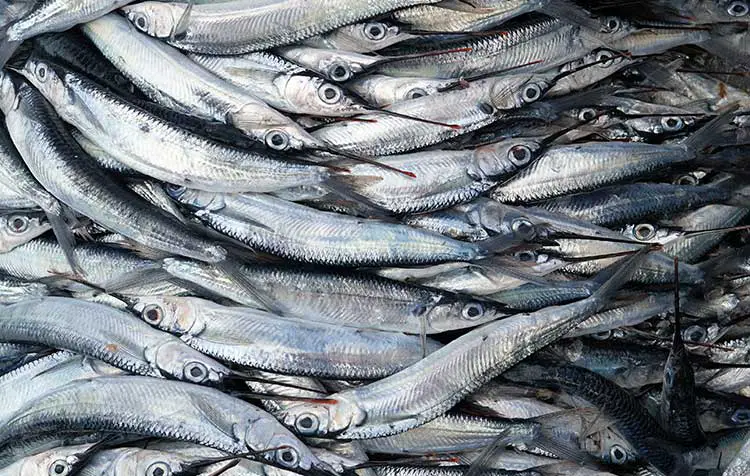




Really a class article. To scare and open eyes. Would have deserved much more attention.
Thanks for your feedback Max!
Class article
Thank you Eric!
Many greetings
Christoph
Hello, this site is really good! I also somehow noticed that almost all the topics are written by Chritsoph. Strong!
Now I would also like to say a little about this topic. Christoph has really made an effort, everything has really helped me! I had to make a presentation about overfishing at school and I said everything that Christoph wrote here. I also got an A!
Christoph, thank you!
Hey Jay! Yeah, thanks for your feedback! I'm so happy for you! 🙂
Best regards,
Christoph
Many fish stocks have already collapsed completely. But the situation is not hopeless. Some countries have already shown that fish stocks can recover through sustainable fisheries management.
Anyone who would have claimed at the beginning of the 20th century that fish in the seas could one day all but disappear would have been declared insane. In the 1950s, after the forced pause in the onset of industrial fishing due to World War II, fish stocks still seemed endless. Many even believed that the sea could sustainably feed the world's ever-growing population. All that was needed was to catch the fish.
But technical progress conquered not only the continents, but also the seas. Within a few decades, industrial fishing spread from the classic fishing areas in the northern hemisphere to all seas.
Bigger and bigger fishing vessels with bigger and bigger engines were able to deploy bigger and bigger nets. And with precision. Where once sharp-edged reefs and wrecks had to be generously circumnavigated to avoid endangering the expensive nets, today highly sensitive 3D sonar equipment, digital maps and satellite navigation ensure fishing with meter precision.
On the open sea, large schools of fish can be located, circumnavigated and captured down to the last specimen. Even the deep sea is no longer spared from this: fishermen today let their nets down to depths of up to 2,000 meters.
Hello Jürgen,
that's right, fishing has become even more accurate and efficient. To the chagrin of the animals. But if we simply stop eating marine animals, the situation is far from hopeless. Change starts with you.
Best regards
Christoph
Comments are closed.